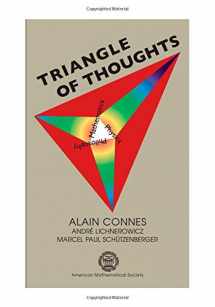
Triangle of Thought
Book details
Summary
Description
Our view of the world today is fundamentally influenced by twentieth century results in physics and mathematics. Here, three members of the French Academy of Sciences: Alain Connes, André Lichnerowicz, and Marcel Paul Schützenberger, discuss the relations among mathematics, physics and philosophy, and other sciences. Written in the form of conversations among three brilliant scientists and deep thinkers, the book touches on, among others, the following questions:
Is there a "primordial truth" that exists beyond the realm of what is provable? More generally, is there a distinction between what is true in mathematics and what is provable?
How is mathematics different from other sciences? How is it the same? Does mathematics have an "object" or an "object of study", the way physics, chemistry and biology do?
Mathematics is a lens, through which we view the world. Connes, Lichnerowicz, and Schützenberger examine that lens, to understand how it affects what we do see, but also to understand how it limits what we can see.
How does a well-informed mathematician view fundamental topics of physics, such as: quantum mechanics, general relativity, quantum gravity, grand unification, and string theory?
What are the relations between computational complexity and the laws of physics?
Can pure thought alone lead physicists to the right theories, or must experimental data be the driving force? How should we compare Heisenberg's arrival at matrix mechanics from spectral data to Einstein's arrival at general relativity through his thought experiments?
The conversations are sprinkled with stories and quotes from outstanding scientists, which enliven the discourse. The book will make you think again about things that you once thought were quite familiar.


We would LOVE it if you could help us and other readers by reviewing the book
Book review



